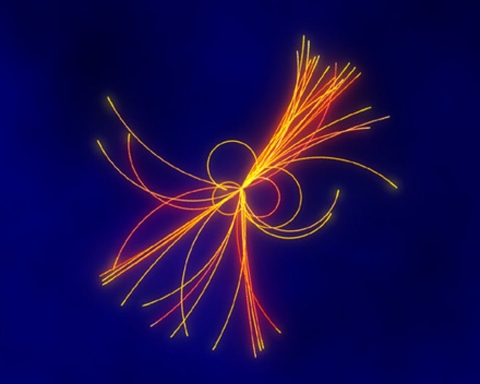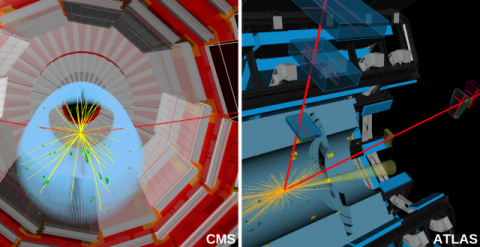Higgs
Higgs boson and the quest for new physics
The discovery of a new particle in 2012 by the ATLAS and CMS experiments at CERN was just the beginning in understanding the properties of this particle and its potential link to some of the most pressing fundamental questions in modern physics.…
Read moreCERN experiments find first evidence for rare Higgs boson decay
The strength of the interaction between the Higgs field and a particle determines the mass it obtains from the Higgs and it is a mystery why the interaction strength is different for different particles. This puzzle is exacerbated as the leptons,…
Read moreThe Higgs boson as a probe for new physics
The discovery of the Higgs boson has ushered in a new era of exploration at the Large Hadron Collider (LHC). Persistent tensions in the Standard Model (SM) of particle physics compel us to seek out physics beyond the SM (BSM) at the TeV scale, and…
Read moreHiggs boson observed decaying to bottom quarks
Last month, the ATLAS and CMS collaborations jointly announced the discovery of the Higgs boson decaying into a matter-antimatter pair of bottom quarks. Previously, the Higgs boson has been observed decaying to photons, tau-leptons, and W and Z…
Read moreATLAS observes Higgs boson produced in association with top quarks
The ATLAS collaboration presented the first evidence of “ttH production”, a rare process where a pair of top quarks emits a Higgs boson. Observing this process would provide new insight into the Higgs mechanism and allow for new studies of how…
Read more007 reasons for physics beyond the Standard Model
The 5th of July marks the fifth anniversary since the discovery of a Higgs boson at the LHC. Summarizing notes for a recent set of lectures at the Asia-Europe-Pacific School of High-Energy Physics, John Ellis reviews events leading to the discovery…
Read morePhysics at 100 TeV
A report discussing the opportunities for physics discoveries with a future 100 TeV hadron circular collider was presented earlier this summer during the 2016 FCC Week. A future hadron-hadron collider machine will be able to cover previously…
Read more

